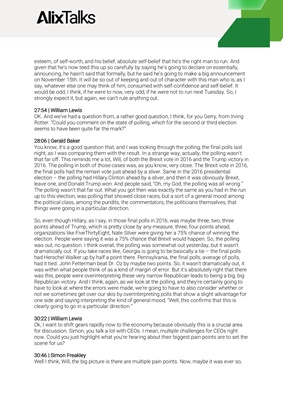
really want to get into what you, the experts, think is going to happen next, what should
happen next?
And for example, we've got a question from Hinda Rabkin saying, where do you see sanctions
on Russian gas going? Panelists will have read Martin Wolf's column in the Financial Times
calling on sanctions specifically around gas. But also, everyone's very mindful of the profound
economic impact that will have, particularly on the German economy. And I think it was the
Belgian Prime Minister who said "Sanctions must have a greater impact on the Russian side
than on the European side. We don't want to wage war on ourselves."
Tom, why don't we get started with you? Do you foresee a broadening and deepening of
sanctions? Do you see, in particular, them leading towards gas at some stage in the near
future?
31:57 | Tom Scampion
Well, I think there's a couple of things there, aren't there? I mean, inevitably, oil and gas are the
focus areas simply because, for example, how much Europe is dependent on Russian oil and
Russian gas. I think 25% of the oil that comes into Europe is from Russia, and 40% of the gas.
Now, this will be a judgment call, in my view, about the efficacy of these sanctions - are they
getting the desired effect? Remember, sanctions are what you do before you go to war, they're
the last thing you do before you go to war to prosecute your foreign policy objectives. Now, if
your foreign policy objectives are not being met, I think you do have to consider things that
come with a significant personal economic cost to the people who are issuing the sanctions.
So, I slightly disagree with the Belgian perspective. I think we're already seeing the fact that
there are significant costs being borne by the people who are issuing these sanctions.
So, the judgment call will be, are we getting the required response from the sanctions? My two
cents from speaking to the U.S. Treasury last week is that there is a profound focus on trying
to measure whether or not the effects that are being seen are happening. Before Biden
decided to sell more oil into the, or at least more oil, into the global economy, I think the
sanctions were affected, were estimated to have just a 2% effect on the Russian economy
because of the increase in the price of oil. So, there are a number of levers at play. I don't think
we are going to be, as a globe, frightened of that issue of suffering the individual cost, but it
will be a judgment call. It'd be a judgment call by the policy issuers to say, are we getting the
returns that we expected in terms of the sanctions being issued?
33:59 | William Lewis
And that raises the elephant in the room, though. What is the definition of success of these
sanctions? If we're putting KPIs against them, what intention? Is it to make us in the West feel
better that we're doing something? Is it actually going to cause some profound issue for
Putin? Wendy, would you like to address what we think the definition of success is for these
sanctions?
34:30 | Wendy Wysong
Right. You know, one of the things that I thought was really interesting, while the sanctions
were being considered, I mean this has been six months and I know people that have been
working on how this rollout was going to work well before any of it actually materialized.
There's still several steps, several things that can happen. We haven't reached the end of it.
We can do sanctions on coal. We could do something with Venezuela. There's obviously been